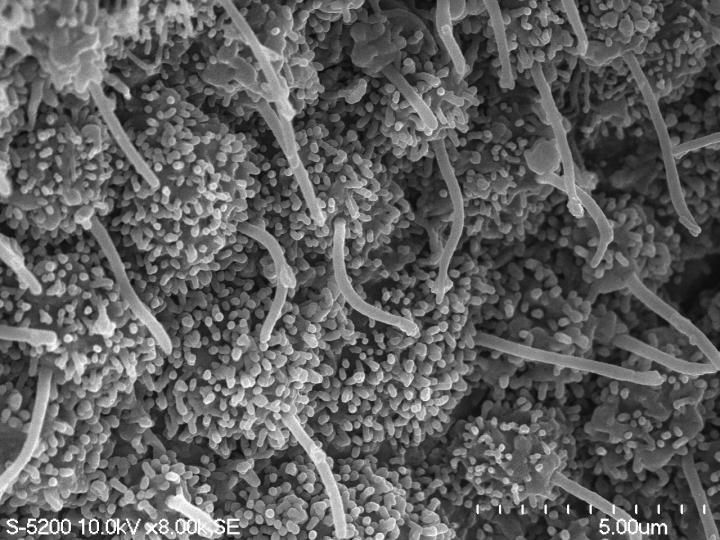Hematopoietic stem cells: Why don't pregnant women become anemic?
Not all genes in the body are permanently switched on; many remain dormant until they are activated by various processes. Triggers can be external influences such as lifestyle, but also diseases and their treatments. A current example is the hematopoietic stem cells in the bone marrow. They are only activated when the organism builds up more red blood cells, for example during pregnancy or after a major blood loss. In their study recently published in Science*, researchers from the Faculty of Medicine at the University of Duisburg-Essen and the University of Texas (USA) show that genetic elements, so-called retrotransposons, are responsible for activating the haematopoietic stem cells.
The study shows how the genes required for hematopoiesis can be switched on in the body when needed. First, the retrotransposons are activated; they are part of the genetic material and can move freely within a genome. The retrotransposons in turn activate the haematopoietic stem cells, which then begin to produce the increased number of red blood cells required in the bone marrow.
"We have observed that retrotransposons increase stem cell activity by activating the immune response and promoting a sterile inflammatory reaction," explains Prof. Dr. Dr. Alpaslan Tasdogan, head of the study and professor in the Department of Dermatology at Essen University Hospital and Emmy Noether & ERC Starting Grant Fellow as well as holder of the Peter-Hans Hofschneider Endowed Professorship. The retrotransposons activate two innate immune sensors, cGAS and STING, which ensure the formation of the signaling molecule interferon and interferon-regulated genes in the hematopoietic stem cells.
The increased production of red blood cells is necessary during pregnancy, for example, in order to supply the mother and the unborn child with sufficient oxygen. If the activation of retrotransposons is suppressed by certain drugs or genetic defects, the red blood cells cannot be produced in sufficient numbers and there is a risk of anemia.
In close collaboration with the gynecologists at Essen University Hospital, the team was able to show that the pregnancy hormone oestrogen plays an important role in the activation process. The researchers investigated the effect of oestrogen on the activation of retrotransposons in non-pregnant mice. "Although we were able to observe an activation effect, it was weaker than in pregnant mice. This indicates that other factors in addition to oestrogen must be involved in the activation process," explains Prof. Dr. Rainer Kimmig, Director of the Department of Obstetrics and Gynecology at Essen University Hospital.
The activation of retrotransposons is also of crucial importance during pregnancy in humans. If, for example, medication has to be taken permanently to treat viral diseases such as HIV, the retrotransposons cannot be activated and the increased blood formation does not occur.
The researchers are aiming to start clinical trials in the near future in order to optimize the care of pregnant women with pre-existing conditions. "The aim is to develop new or improved treatment and care strategies for anemia," says Prof. Dr. Dr. Alpaslan Tasdogan.
Note: This article has been translated using a computer system without human intervention. LUMITOS offers these automatic translations to present a wider range of current news. Since this article has been translated with automatic translation, it is possible that it contains errors in vocabulary, syntax or grammar. The original article in German can be found here.
Original publication
Julia Phan, Brandon Chen, Zhiyu Zhao, Gabriele Allies, Antonella Iannaccone, Animesh Paul, Feyza Cansiz, Alberto Spina, Anna-Sophia Leven, Alexandra Gellhaus, Dirk Schadendorf, Rainer Kimmig, Marcel Mettlen, Alpaslan Tasdogan, Sean J. Morrison; "Retrotransposons are co-opted to activate hematopoietic stem cells and erythropoiesis"; Science, 2024-10-24
Original publication
Julia Phan, Brandon Chen, Zhiyu Zhao, Gabriele Allies, Antonella Iannaccone, Animesh Paul, Feyza Cansiz, Alberto Spina, Anna-Sophia Leven, Alexandra Gellhaus, Dirk Schadendorf, Rainer Kimmig, Marcel Mettlen, Alpaslan Tasdogan, Sean J. Morrison; "Retrotransposons are co-opted to activate hematopoietic stem cells and erythropoiesis"; Science, 2024-10-24
Organizations
Other news from the department science

Get the life science industry in your inbox
By submitting this form you agree that LUMITOS AG will send you the newsletter(s) selected above by email. Your data will not be passed on to third parties. Your data will be stored and processed in accordance with our data protection regulations. LUMITOS may contact you by email for the purpose of advertising or market and opinion surveys. You can revoke your consent at any time without giving reasons to LUMITOS AG, Ernst-Augustin-Str. 2, 12489 Berlin, Germany or by e-mail at revoke@lumitos.com with effect for the future. In addition, each email contains a link to unsubscribe from the corresponding newsletter.
Most read news
More news from our other portals
Last viewed contents
Signaling Continued Investment in China, Bruker Open Beijing Center of Excellence
Synthon announces European approvals for Eplerenone
Daboia_russelii_siamensis
Category:Leukodystrophies
Cyntellect Appoints Drs. Alan Aderem, Charles Cantor and Michael Hanley to Its Scientific Advisory Board - New members to foster expanded applications of cell-based manipulation from functional proteomics to stem cells






















































